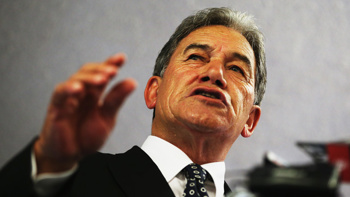
The Reserve Bank’s higher-than-expected Official Cash Rate hike “will push New Zealand into recession”, an economist says.
The bank today lifted the Official Cash Rate by 50 basis points to 5.25 per cent.
The 11th successive hike, it takes the rate to its highest level since December 2008.
Inflation is still too high and persistent, and employment is beyond its maximum sustainable level. The recent severe weather events in the North Island have led to higher prices for some goods and services, the RBNZ said.
Abhijit Surya, who works for Sydney-based Capital Economics, said the move “will push New Zealand into recession”.
“The RBNZ’s tightening bias all but firms up our forecast that New Zealand will enter a protracted recession this year,” they said.
Capital Economics expects the downturn will be so sharp that we will see rates being cut by the end of the year.
National’s finance spokesperson Nicola Willis said today’s 50-point lift in the OCR was a “punch in the guts”.
She said it means far more pain for New Zealand families.
”Mortgage-holders up and down the country were holding their breath and hoping for some relief. Instead, they’ve been given another punch in the guts.
”This is the 11th consecutive hike in the Official Cash Rate. Around half of New Zealand mortgage holders will be re-fixing their mortgages in the next six months, meaning many will see their interest rates double from 3 per cent or less to more than 6 per cent.”
Willis said the speed of this hike will leave many “scrambling, trying to find hundreds of dollars more every fortnight just to stand still”.
”Some will be unable to do that,” Willis said. “Sadly, for too many Kiwis this will be the punch that sends them off the edge, into mortgage arrears, unwanted house sales and financial distress.”
Willis said New Zealand is “enduring a prolonged cost of living crisis”.
”New Zealand’s inflation rate is higher than Australia’s, the USA’s and many other countries we like to compare ourselves with.
ASB said recent weather disasters were “more inflationary than initially assumed in February”.
“A final 25 basis-point increase in May, to 5.50 per cent, is our new forecast – but it’s a lineball call,” ASB said in a statement.
The New Zealand Council of Trade Unions (NZCTU) said the RBNZ should pause before it considers further increases in interest rates, says NZCTU economist Craig Renney.
”RBNZ today chose to increase interest rates by 0.5 per cent, above market expectations. Internationally, inflation is falling in advanced economies.
”Some Reserve Banks such as the Reserve Bank of Australia are holding their interest rates. They have recognised that monetary policy operates with a significant lag, meaning that much of the impact of the increased interest rates have yet to be felt,” Renney said.
”The last NZIER Quarterly Survey of Business Opinion showed that capacity constraints were easing. Now is not the time to be adding further interest rates increases when the impact of existing OCR changes are yet to be discovered. The Monetary Policy Statement today made scant mention of the employment impacts of these changes.”
Unemployment in New Zealand has been rising in recent quarters, and too many New Zealanders are underutilised in the labour market, Renney said.
”To say that unemployment is above its maximum sustainable level is to accept that tens of thousands more Kiwis must become unemployed.
”We reject that approach and the idea that some of the most vulnerable must pay the price for inflation control.”
Renney said placing the impact of inflation control “onto the back of working people is neither fair nor economically sustainable”.
The New Zealand dollar rallied sharply on the higher-than-expected hike. In the minutes following the release, the kiwi was trading at US63.6c, up about half a US cent from US63.08 before the release.
The RBNZ effectively shrugged off global banking woes. “The Committee’s assessment is that there is no material conflict between lowering inflation and maintaining financial stability in New Zealand,” it said.
“However, wholesale interest rates have fallen significantly since the February Statement, and this could put downward pressure on lending rates,” it said. “As a result, a 50 basis point increase in the OCR was seen as helping to maintain the current lending rates faced by businesses and households, while also supporting an increase in retail deposit rates.”
In other words, the RBNZ appears concerned that a smaller hike may have resulted in mortgage rates falling.
“Members agreed that the sooner supply and demand were better matched in the economy, the lower the overall cost of reducing inflation.”
The two-year swap rate, which has an influence on home mortgage rates, gained 15 basis points to 5.1 per cent.
”No one saw this coming,” Imre Speizer, senior markets strategist at Westpac, said. ”The markets are extremely busy dealing with the shock,” he said.
Pundits had expected there would be a pullback from the 50 basis point hike forecast after the last Monetary Policy Statement in February - and that the peak for rate hikes will now be 5.25 per cent, rather than the 5.5 per cent previously expected.
Today’s decision is a briefer Monetary Policy Review, as opposed to a full Monetary Policy Statement.
That means the RBNZ and Governor Adrian Orr will likely give less away in terms of the overall economic outlook.
Economists this week told the Herald a 25 basis point increase was most likely.
Yesterday, the Reserve Bank of Australia paused interest rate hikes, leaving its official cash rate at 3.6 per cent.
That decision followed consecutive interest rate rises across the Tasman since May last year.
Take your Radio, Podcasts and Music with you








